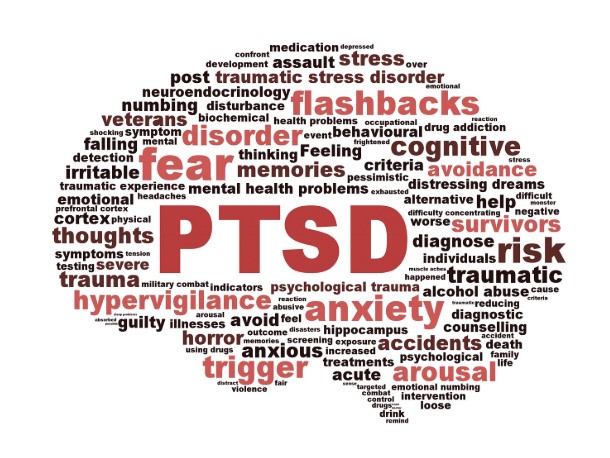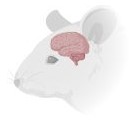13 5.5: Cannabis in Mental Health Disorders
Learning Objectives
After reading this section, you will be able to:
- Describe how the ECS plays a role in PTSD
- List what symptoms of PTSD may be alleviated with cannabinoids
- Explain cannabis abuse
Post-Traumatic Stress Disorder
Neurobiological Implications of PTSD

In addition to treating pain, cannabis derivatives can also be used to manage mood disorders such as PTSD, a psychiatric disorder that develops when some experiences or witnesses a traumatic event. Cannabis can be an effective way to manage one’s mental health because the ECS is also involved in mood regulation. Changes in the ECS caused by irregulated CB1 receptor and ligand levels can cause emotional and behavioral changes that are associated with PTSD. The role the ECS plays in PTSD indicates that medical cannabis could assist in modulating CB1 levels to eliminate these harmful symptoms.
YOU CAN(NABIS) LEARN MORE…
Many times, PTSD is associated with jarring flashbacks that force the patient to relive what they experienced or witnessed. This happens often in veterans and sexual assault survivors. Some may experience panic attacks while others may undergo a catatonic state. Some may experience hyperarousal while others may dissociate. Symptoms vary from person to person and are dependent on what the patient experienced.
Alleviating PTSD Symptoms
Aside from re-experiencing traumatic events, PTSD victims also suffer from insomnia. A study stated that those who have more intense PTSD are more likely to use cannabis in order to help with any sleeping problems they might have. Some of them even stated that using cannabis has decreased their need for other prescription drugs that would help them sleep.
Unfortunately, having suicidal thoughts or behaviors is also common amongst PTSD patients. Biologically speaking, this is, again, due to the dysregulated CB1 receptors in the ECS. However, cannabis derivatives have proven to be able to reduce suicidal thoughts along with PTSD behaviors in patients.
Family members of the patients have been able to attest to the fact that moods have improved with the use of medical cannabis. Overall, cannabinoids have been able to alleviate most of the harmful symptoms of PTSD, providing patients and their families with more relief and security.
Other Mood Disorders
Depression and Anxiety
Even when not associated with PTSD, cannabinoids have been able to help patients with their depression and anxiety as well since the ECS plays a dominant role in both of these disorders. Studies have shown that the activators and the inhibitors of the ECS receptors can function like antidepressants. Through the use of cannabis derivatives, one can balance neurotransmitter levels, such as serotonin and dopamine, and patients can be in a better mood and regain interest in daily activities.
Along with depression, anxiety disorders can be crippling and are one of the most prevalent mental health disorders. Similar to PTSD, a complete knockout of the CB1 receptor correlated to increased anxiety levels. However, the researchers were able to alleviate symptoms of anxiety with low doses of cannabis derivatives such as THC.

YOU CAN(NABIS) LEARN MORE…
Mouse models are often used in experiments such as this. They are easy to manipulate so that the mouse’s biological characteristics of certain diseases mirror those of humans.
Dangers of Cannabis Overuse
Cannabis Abuse

Cannabis therapy can be beneficial as long as it does not turn into cannabis abuse. While researching the effects of cannabis on mental illnesses such as depression and anxiety, some have discovered that high doses of cannabinoids can actually increase poor mental health symptoms as opposed to decreasing it. Some studies have shown that those without mental health disorders can develop them if cannabis is overused. There is no standardized amount that is considered “too much” as the effects of different doses can vary from person to person. Thus, it is best to take everything in moderation and consult a physician before self-medicating with cannabis in order to alleviate any symptoms of mental illnesses.
Challenge Yourself!
